|
|
|
Sort Order |
|
|
|
Items / Page
|
|
|
|
|
|
|
| Srl | Item |
| 1 |
ID:
152110


|
|
|
|
|
| Summary/Abstract |
Though aesthetics is commonly understood as the reflection on art, and especially beauty, it is a broader concern, captured by the term’s etymology in the Greek ‘aisthesis’, referring to perception and sense impressions. Aesthetics, though, is not simply a passive process, of how the outer world strikes the mind, but an interactive one, which, through our selective attention, we attenuate the complexities of reality. Aesthetics is about the formation of the objects that constitute our social milieu, those we invest in to give rhythm, order and unity to our lives. Aesthetics is also, vitally, about the formation of the self, about how we constitute ourselves as objects in relation to the world.
|
|
|
|
|
|
|
|
|
|
|
|
|
|
|
|
| 2 |
ID:
151584
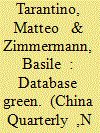

|
|
|
|
|
| Summary/Abstract |
Significant efforts towards environmental transparency have been made by the Chinese government since 2008. This paper focuses on the technical decisions shaping a database of official pollution information built and operated by a Chinese NGO known as the Institute of Public and Environmental Affairs (IPE). Issues of standardization, power distribution and institutional fragmentation are discussed. The paper illustrates a case of NGOs integrating enforcement capabilities as data centres amidst the growing reliance on processes of informational governance of environmental issues.
|
|
|
|
|
|
|
|
|
|
|
|
|
|
|
|
| 3 |
ID:
154078
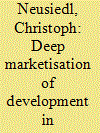

|
|
|
|
|
| Summary/Abstract |
This article introduces the concept of ‘deep marketisation’ as a relatively new, contemporary phase of neoliberal development policy in Bangladesh. By looking into the development strategy of the country’s energy sector, the article shows how an emphasis on marketisation through public-private partnerships (PPPs) and other strategies advances a market fundamentalist agenda to strengthen the private sector and establish a world market. By drawing on interviews with development practitioners from various development organisations in Bangladesh, the article further reveals how development conceptualisations are shaped by the strategy of deep marketisation, leading to the impoverishment of development by constraining its field of actions to measures based on the primacy of economic growth and private sector-led economic development, at the same time leading to a re-legitimisation of flawed neoliberal development policies that result in further inequality, poverty and environmental degradation.
|
|
|
|
|
|
|
|
|
|
|
|
|
|
|
|
| 4 |
ID:
155141


|
|
|
|
|
| Summary/Abstract |
Colonialism, imperialism and anti-imperialism have been decisive in shaping Cuban political identity for 150 years. US determination to control Cuba, consistent with the Monroe Doctrine, had a strong economic rationale even before Spain was defeated in the War of Independence in 1898. Debate raged between Cubans who aspired to true independence and an annexationalist minority, who favoured union with the US. The Platt Amendment imposed on Cuba by the US in 1903 ‘reduced the independence and sovereignty of the Cuban republic to a myth’. Between then and the Revolution of 1959 Cuba was effectively first a protectorate and then neo-colony of the US, which dominated the Cuban economy, politics and foreign policy. Tackling the terrible socioeconomic and political effects of Cuba’s subjugation under the Spanish empire and then US imperialism necessitated a radical transformation of the Cuban economy, political institutions and power structures. The transition to socialism inevitably meant confronting US imperialism – and vice versa. Since 1959, US imperialism, with its powerful allies in the right-wing exile community based in Miami, have relentlessly tried to destroy the Revolution and Cuban socialism. The issue of imperialism remains key today, in the post-Fidel, President Trump era.
|
|
|
|
|
|
|
|
|
|
|
|
|
|
|
|
| 5 |
ID:
145108
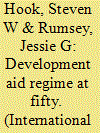

|
|
|
|
|
| Summary/Abstract |
The paper considers the status of the global development aid regime, which originated in 1960 and remains the primary conduit for the delivery of Official Development Assistance (ODA) to impoverished states. We begin by situating the inquiry in regime analysis, which emerged in the 1970s to explain patterns of interstate cooperation that were not captured by existing paradigms of world politics. We then suggest a means by which the cohesion of a given transnational regime may be tested over time. Specifically, we trace the ODA regime's adherence to its own procedural standards between 1961 and 2011 and find that, while the ODA regime has consistently failed to reach its quantitative targets, it has surpassed its qualitative targets, such as the ratio of grants to loans, since the 1990s. Finally, we examine aid transfers from non-DAC sources and consider to what extent this activity can be reconciled with the ODA regime's practices in their current form. We also question whether the challenges posed by non-DAC donors reflect regime erosion and, if so, whether this can be attributed to the decline of its leading member (the United States), as theories of hegemonic stability expect.
|
|
|
|
|
|
|
|
|
|
|
|
|
|
|
|
| 6 |
ID:
170016
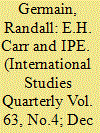

|
|
|
|
|
| Summary/Abstract |
Although the work of E.H. Carr has a prominent place in the scholarly history of international relations (IR), it is notably absent from the discipline of international political economy (IPE). This is puzzling, because Carr's analysis of international politics places a strong emphasis on the organic connection between politics and economics on an international scale. On this reading, his principal publications on IR can also be seen to chart a sophisticated conceptualization of what I want to label historical IPE. This essay retrieves such a reading of Carr for the discipline of IPE. It begins by interrogating the way in which Carr's work has been appropriated by modern IPE scholarship, in order to highlight the limited use made of the political economy dimension of his research. I then explore the historical and political economy aspects of Carr's writings to consider how his contribution might advance recent contemporary theoretical debate in the discipline. I pay particular attention to how his work charts an historical conception of IPE that can synthesize and move beyond the rationalist/constructivist binary that currently dominates theorizing in the discipline.
|
|
|
|
|
|
|
|
|
|
|
|
|
|
|
|
| 7 |
ID:
145112
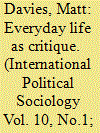

|
|
|
|
|
| Summary/Abstract |
This article argues that critical International Political Economy (IPE) has used an undertheorized notion of everyday life and that Henri Lefebvre’s approach to everyday life, when augmented by attending to specifically colonial modes of domination, provides a necessary theoretical basis for IPE to engage with the everyday. It thus explores the connections between critical IPE, the critique of everyday life, and postcolonial thought. It begins by examining the “turn” to the everyday in IPE, examining the consequences of its reliance on an untheorized notion of the everyday. Lefebvre’s critique of everyday life is then examined to address these shortcomings. But Lefebvre’s provocation about the colonization of the everyday also requires greater conceptual clarity. Thus, the article goes on to examine the affinities between postcolonial thought and the critique of everyday life. This underscores the indispensability of Lefebvre’s critique in terms both of everyday life and of the international as constituted by colonization.
|
|
|
|
|
|
|
|
|
|
|
|
|
|
|
|
| 8 |
ID:
133646
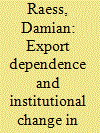

|
|
|
|
|
| Publication |
2014.
|
| Summary/Abstract |
This article explores the adjustment of wage bargaining institutions to international trade in Germany. Embracing IPE as opposed to CPE lenses yields a novel interpretation of change in the institution of wage bargaining. Export dependence of a sector, we argue, has destabilizing effects for industry-wide bargaining by sparking an intra-sectoral cleavage between domestic- and export-oriented enterprises. Specifically, the greater the degree of export dependence of a sector, the greater the degree to which domestic-oriented enterprises within that sector will abandon collective bargaining. We also explain how workplace employee representation through works councils mitigates this effect, such that the presence of works councils helps domestically oriented firms to hold to collective bargaining agreements in the face of a sector's deepening exposure to export markets. These claims find empirical support in the history of labor relations developments in the metal industry and, especially, in extensive analysis of a cross-section of establishments. Our findings attribute major responsibility to the firms driving globalization for undermining collective bargaining institutions and suggest that economic globalization is a cause of dualization. In all, the article provides fresh ammunition for a version of globalization-induced institutional convergence. [Correction added after online publication on May 28, 2014: "conversion" changed to "convergence" in preceding sentence.]
|
|
|
|
|
|
|
|
|
|
|
|
|
|
|
|
| 9 |
ID:
157888
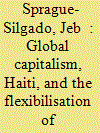

|
|
|
|
|
| Summary/Abstract |
This paper looks at the shifting manner in which paramilitarism has been reproduced in Haiti, examining how it has evolved from the Cold War into the era of capitalist globalisation. The central argument of this article is that paramilitarism has not disappeared but has been altered, and that this has occurred in part due to the changing strategies of elites in the global era. Rather than a permanent and widespread force, paramilitary groups are utilised in smaller numbers and only in certain ‘emergency periods’, serving a purpose of containment: targeting political threats and beating down those large populations whose social reproduction is not required by transnational capital. This has been a difficult situation for elites to manage, as they often have only limited control over such ruthless, corrupt and violent elements, which they sometimes require. Following the 1991 and 2004 coup d’états in Haiti, a military–paramilitary–bourgeoisie grouping has repeatedly worked to recover its impunity and revamp its coercive apparatus. Under these conditions, and even more increasingly in the wake of the 2010 earthquake, a variety of elites and technocrats (most importantly, US policymakers) have sought to politically remake the country alongside processes of economic restructuring promoted by transnational capital.
|
|
|
|
|
|
|
|
|
|
|
|
|
|
|
|
| 10 |
ID:
139797
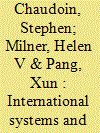

|
|
|
|
|
| Summary/Abstract |
Following older debates in international relations literature concerning the relative importance of domestic versus systemic factors, newer debates emphasize interdependence among states and the complex interactions between systemic and domestic factors. As globalization and democratization advance, theories and empirical models of international politics have become more complicated. We present a systematic theoretical categorization of relationships between domestic and systemic variables. We use this categorization so that scholars can match their theory to the appropriate empirical model and assess the degree to which systemic factors affect their arguments. We also present two advances at the frontier of these empirical models. In one, we combine hierarchical models of moderating relationships with spatial models of interdependence among units within a system. In the other, we provide a model for analyzing spatial interdependence that varies over time. This enables us to examine how the level of interdependence among units has evolved. We illustrate our categorization and new models by revisiting the recent international political economy (IPE) debate over the relationship between trade policy and regime type in developing countries.
|
|
|
|
|
|
|
|
|
|
|
|
|
|
|
|
| 11 |
ID:
082460
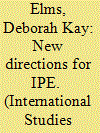

|
|
|
|
|
| Publication |
2008.
|
| Summary/Abstract |
Many of the research approaches currently under investigation by behavioral economists are even better suited for international political economy research. The three research ideas illustrated in this article-framing and loss aversion, myopic time horizons, and fairness-highlight concepts of considerable utility for IPE researchers. This article uses previously published International Organization articles, reformulated to consider the same puzzles from a different angle, to illustrate the application of these concepts. This allows readers the opportunity to consider an extended comparison of theoretical explanations of the same empirical evidence. Incorporating more of the knowledge drawn from psychology and current economics will yield superior explanations for political economy research questions that are more accurate, generalizable, parsimonious, and testable.
|
|
|
|
|
|
|
|
|
|
|
|
|
|
|
|
| 12 |
ID:
141200
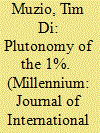

|
|
|
|
|
| Summary/Abstract |
This article offers a study on the plutonomy of dominant owners and what their consumptive practices might tell us from the lens of the capital as power framework in IPE. I argue that the differential consumption of dominant owners is an important dimension of an internationalised capitalist mode of power for two reasons. First, Nitzan and Bichler argue that the primary driver of accumulation is the desire for differential power symbolically expressed in a magnitude of money. In this article, I argue that there is a secondary dimension noted but underdeveloped in their framework and influenced by Veblen: the drive for social status and the display of positionality through differential intraclass consumption. Second, as identified by Kempf, I argue that the consumptive practices of dominant owners are helping to lock global society into an unsustainable and ethically indefensible quest for perpetual economic growth. This growth project not only undermines calls for needed social and economic change but also threatens populations with environmental collapse.
|
|
|
|
|
|
|
|
|
|
|
|
|
|
|
|
| 13 |
ID:
179048
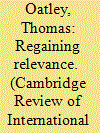

|
|
|
|
|
| Summary/Abstract |
Mainstream American international political economy (IPE) has gradually lost relevance as a framework for understanding developments in the global political economy. It offers little help for understanding the impact of the China Shock, the development and consequences of the Global Financial Crisis, or the anti-system politics that began to emerge in 2016. These are the three developments that largely defined global political economy during the first quarter of the twenty-first century. It is even less helpful for explaining the climate crisis and the energy transition, the issues that will increasingly shape the global political economy for the next quarter century and beyond. Restoring relevance to American IPE will require the development of theoretical frameworks that are intrinsically systemic and dynamic. I suggest that the Uneven and Combined Development, and the Political Economy of Complex Interdependence, perspectives, supplemented by greater attention to system parameters, provide a strong foundation upon which to build such frameworks.
|
|
|
|
|
|
|
|
|
|
|
|
|
|
|
|
| 14 |
ID:
110213
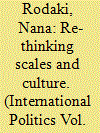

|
|
|
|
|
| Publication |
2012.
|
| Summary/Abstract |
The article argues that critical International Political Economy can benefit from a trans-disciplinary approach to the role of cities as socio-economic actors in the global political economy. The constitution and exercise of agency is far from an automatic response to the global restructuring of capitalist social relations, but the product of historically and context-specific economic and extra-economic social processes and social struggles. Cities (re)emerge as subjects and objects of governance and intervention and seek to become (dis)embedded in multi-scalar networks of economic and symbolic power. In this process, they become active co-producers of the global political economy, in ways that cut across spatial scales and narrow geographical imaginations.
|
|
|
|
|
|
|
|
|
|
|
|
|
|
|
|
| 15 |
ID:
170607
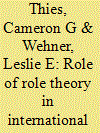

|
|
|
|
|
| Summary/Abstract |
This article demonstrates the benefits of using a role theory approach in the field of international political economy (IPE) by demonstrating its benefits relative to variants of the social constructivist paradigm, especially vis-à-vis identity-based accounts of IPE. This article also documents how role theory always had a home in IPE even before the constructivist revolution in the 1990s. The social interactionist dimension in the work of Herbert Mead and his notion of a general other are linked to the relational ideas of friendship and impartial spectator present in the works of the founding father of classical political economy, Adam Smith. These similar ideas about the self and their surrounding social environment are a useful starting point to locate role theory in IPE and demonstrate its analytical advantages within social constructivism. After showing the ‘forgotten’ place role theory has always had in IPE, the article illustrates the potential of using a role theory approach within the field of IPE through an illustrative analysis of the Greek economic crisis.
|
|
|
|
|
|
|
|
|
|
|
|
|
|
|
|
| 16 |
ID:
179047
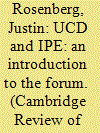

|
|
|
|
|
| Summary/Abstract |
What is the significance of UCD for the field of International Political Economy? In 2019, Justin Rosenberg and Chris Boyle argued that Trotsky’s idea provided an understanding of capitalist world development that helped explain the 2016 Brexit vote and the election of Donald Trump (Rosenberg and Boyle 2019). Situating these events in the longue durée, they interpreted them as outcomes of a unique historical conjuncture of uneven and combined development: neoliberal deregulation in the West had intersected with late-late industrialisation in China; this ‘simultaneity of the non-simultaneous’ multiplied the ‘big country’ effects of China’s industrialisation at a point of maximum openness in the newly deregulated international economy; this produced a major ‘trade shock’ that hastened the decline of manufacturing employment in Britain and the United States, in a geographical pattern that matched the distribution of the Leave and Trump votes.
|
|
|
|
|
|
|
|
|
|
|
|
|
|
|
|
|
|
|
|
|